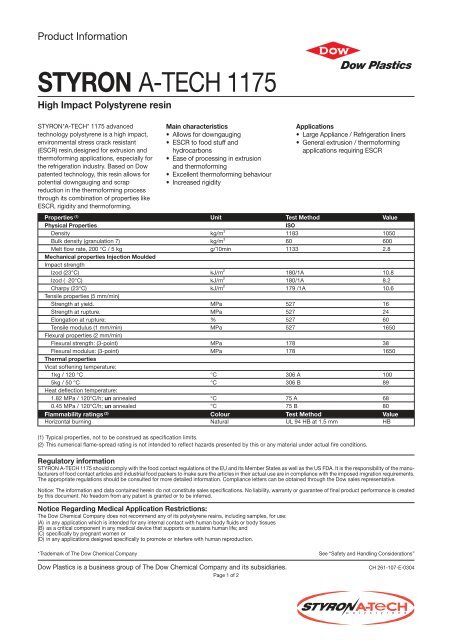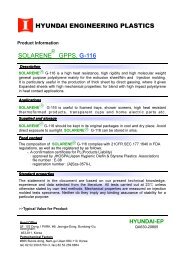STYRON A-TECH 1175
STYRON A-TECH 1175
STYRON A-TECH 1175
You also want an ePaper? Increase the reach of your titles
YUMPU automatically turns print PDFs into web optimized ePapers that Google loves.
Product Information<br />
<strong>STYRON</strong> A-<strong>TECH</strong> <strong>1175</strong><br />
High Impact Polystyrene resin<br />
<strong>STYRON</strong>*A-<strong>TECH</strong>* <strong>1175</strong> advanced<br />
technology polystyrene is a high impact,<br />
environmental stress crack resistant<br />
(ESCR) resin,designed for extrusion and<br />
thermoforming applications, especially for<br />
the refrigeration industry. Based on Dow<br />
patented technology, this resin allows for<br />
potential downgauging and scrap<br />
reduction in the thermoforming process<br />
through its combination of properties like<br />
ESCR, rigidity and thermoforming.<br />
Main characteristics<br />
• Allows for downgauging<br />
• ESCR to food stuff and<br />
hydrocarbons<br />
• Ease of processing in extrusion<br />
and thermoforming<br />
• Excellent thermoforming behaviour<br />
• Increased rigidity<br />
Applications<br />
• Large Appliance / Refrigeration liners<br />
• General extrusion / thermoforming<br />
applications requiring ESCR<br />
Properties (1) Unit Test Method Value<br />
Physical Properties<br />
ISO<br />
Density kg/m 3 1183 1050<br />
Bulk density (granulation 7) kg/m 3 60 600<br />
Melt flow rate, 200 °C / 5 kg g/10min 1133 2.8<br />
Mechanical properties Injection Moulded<br />
Impact strength<br />
Izod (23°C) kJ/m 2 180/1A 10.8<br />
Izod ( _ 20°C) kJ/m 2 180/1A 8.2<br />
Charpy (23°C) kJ/m 2 179 /1A 10.6<br />
Tensile properties (5 mm/min)<br />
Strength at yield. MPa 527 16<br />
Strength at rupture. MPa 527 24<br />
Elongation at rupture: % 527 60<br />
Tensile modulus (1 mm/min) MPa 527 1650<br />
Flexural properties (2 mm/min)<br />
Flexural strength: (3-point) MPa 178 38<br />
Flexural modulus: (3-point) MPa 178 1650<br />
Thermal properties<br />
Vicat softening temperature:<br />
1kg / 120 °C °C 306 A 100<br />
5kg / 50 °C °C 306 B 89<br />
Heat deflection temperature:<br />
1.82 MPa / 120°C/h; un annealed °C 75 A 68<br />
0.45 MPa / 120°C/h; un annealed °C 75 B 80<br />
Flammability ratings (2) Colour Test Method Value<br />
Horizontal burning Natural UL 94 HB at 1.5 mm HB<br />
(1) Typical properties, not to be construed as specification limits.<br />
(2) This numerical flame-spread rating is not intended to reflect hazards presented by this or any material under actual fire conditions.<br />
Regulatory information<br />
<strong>STYRON</strong> A-<strong>TECH</strong> <strong>1175</strong> should comply with the food contact regulations of the EU and its Member States as well as the US FDA. It is the responsibility of the manufacturers<br />
of food contact articles and industrial food packers to make sure the articles in their actual use are in compliance with the imposed migration requirements.<br />
The appropriate regulations should be consulted for more detailed information. Compliance letters can be obtained through the Dow sales representative.<br />
Notice: The information and data contained herein do not constitute sales specifications. No liability, warranty or guarantee of final product performance is created<br />
by this document. No freedom from any patent is granted or to be inferred.<br />
Notice Regarding Medical Application Restrictions:<br />
The Dow Chemical Company does not recommend any of its polystyrene resins, including samples, for use:<br />
(A) in any application which is intended for any internal contact with human body fluids or body tissues<br />
(B) as a critical component in any medical device that supports or sustains human life; and<br />
(C) specifically by pregnant women or<br />
(D) in any applications designed specifically to promote or interfere with human reproduction.<br />
*Trademark of The Dow Chemical Company<br />
Dow Plastics is a business group of The Dow Chemical Company and its subsidiaries.<br />
Page 1 of 2<br />
See “Safety and Handling Considerations”<br />
CH 261-107-E-0304
Safety and Handling Considerations<br />
Material safety data sheets for <strong>STYRON</strong> polystyrene<br />
resins are available from Dow Plastics,<br />
a business group of The Dow Chemical Company<br />
and its subsidiaries. Safety data sheets<br />
are provided to help customers satisfy their<br />
own handling, safety and disposal needs,<br />
and those that may be required by locally<br />
applicable health and safety regulations such<br />
as OSHA (USA), MAK (Germany) or WHMIS<br />
(Canada). Safety data sheets are upgraded<br />
regularly, therefore, please request and review<br />
the most current Safety data sheets before<br />
handling or using any product.<br />
The following comments are general and<br />
apply only to <strong>STYRON</strong> polystyrene resins as<br />
supplied. Various additives and processing<br />
aids used in fabrication and other materials<br />
used in finishing steps have their own safe use<br />
profile and must be investigated separately.<br />
Hazards and Handling Precautions<br />
<strong>STYRON</strong> polystyrene resins have a very low<br />
degree of toxicity and under normal conditions<br />
of use should pose no unusual problems<br />
from ingestion, eye or skin contact. However,<br />
caution is advised when handling, storing,<br />
using or disposing of these resins and good<br />
housekeeping and controlling of dusts are<br />
necessary for safe handling of product.<br />
Workers should be protected from the possibility<br />
of contact with molten resin during<br />
fabrication.<br />
Handling and fabrication of plastic resins can<br />
result in the generation of vapours and dusts.<br />
Dusts resulting from sawing, filing and sanding<br />
of plastic parts in post-moulding operations<br />
may cause irritation to eyes and upper<br />
respiratory tract. In dusty atmospheres, use<br />
an approved dust respirator.<br />
Granules or beads may present a slipping hazard.<br />
Good general ventilation of the polymer<br />
processing area is recommended. Processing<br />
may release fumes which may include polymer<br />
fragments and other decomposition products.<br />
Fumes can be irritating. At temperatures<br />
exceeding melt temperature, polymer fragments<br />
can occur. Good general ventilation<br />
should be sufficient for most conditions.<br />
Local exhaust ventilation may be necessary<br />
for some operations.<br />
Use safety glasses. If there is a potential for<br />
exposure to particles which could cause<br />
mechanical injury to the eye, wear chemical<br />
goggles. If vapour exposure causes eye<br />
discomfort, use a full-face respirator. No other<br />
precautions other than clean body-covering<br />
clothing should be needed for handling<br />
<strong>STYRON</strong> polystyrene resins. Use gloves with<br />
insulation for thermal protection, when<br />
needed.<br />
Combustibility<br />
<strong>STYRON</strong> polystyrene resins will burn, and<br />
once ignited, may burn rapidly under the right<br />
conditions of heat and oxygen supply. Do not<br />
permit dust to accumulate. Dust layers can<br />
be ignited by spontaneous combustion<br />
or other ignition sources. When suspended<br />
in air, dust can pose an explosion hazard.<br />
Dense black smoke is produced when product<br />
burns. Toxic fumes are released in fire<br />
situations.<br />
Fire fighters should wear positive-pressure,<br />
self-contained breathing apparatus and full<br />
protective equipment. Water or water fog are<br />
the preferred extinguishing media. Foam,<br />
alcohol resistant foam, carbon dioxide, or dry<br />
chemicals may also be used. Soak thoroughly<br />
with water to cool and prevent re-ignition.<br />
Disposal<br />
DO NOT DUMP INTO ANY SEWERS, ON THE<br />
GROUND, OR INTO ANY BODY OF WATER.<br />
For unused or uncontaminated material,<br />
the preferred options include sending to a<br />
licensed recycler, reclaimer, incinerator or<br />
other thermal destruction device. For used or<br />
contaminated material, the disposal options<br />
remain the same, although additional evaluation<br />
is required (see, for example, in the USA<br />
40 CFR, Part 261, “Identification and Listing<br />
of Hazardous Waste”). All disposal methods<br />
must be in compliance with Federal, State/<br />
Provincial and local laws and regulations.<br />
As a service to its customers, Dow can provide<br />
lists of companies which recycle, reprocess,<br />
or manage chemicals or plastics,<br />
and companies that manage used drums.<br />
Contact the nearest Dow sales office for<br />
further details.<br />
Environment<br />
Generally speaking, in the environment lost<br />
pellets are not a problem except under<br />
unusual circumstances – when they enter<br />
the marine environment. They are inert and<br />
benign in terms of their physical environmental<br />
impact, but if ingested by waterfowl<br />
or aquatic life, they may mechanically cause<br />
adverse effects. Spills should be minimised<br />
and they should be cleaned up when they<br />
happen. Plastics should not be discarded<br />
into the ocean or any other body of water.<br />
Product Stewardship<br />
The Dow Chemical Company has a fundamental<br />
concern for all who make, distribute<br />
and use its products, and for the environment<br />
in which we live. This concern is the basis<br />
of our Product Stewardship philosophy by<br />
which we assess the health and environmental<br />
information on our products and then<br />
take appropriate steps to protect employee<br />
and public health and the environment. Our<br />
Product Stewardship programme rests with<br />
every individual involved with Dow products<br />
from the initial concept and research to the<br />
manufacture, sale, distribution, and disposal<br />
of each product.<br />
Customer Notice<br />
Dow encourages its customers and potential<br />
users of Dow products to review their applications<br />
for such products from the standpoint<br />
of human health and environmental quality.<br />
To help ensure that Dow products are not<br />
used in ways for which they are not intended<br />
or tested, Dow personnel will assist customers<br />
in dealing with ecological and product<br />
safety considerations. Your Dow sales representative<br />
can arrange the proper contacts.<br />
Dow literature, including Material Safety Data<br />
sheets, should be consulted prior to the use<br />
of Dow products. These are available from<br />
the nearest Dow sales office. For further<br />
information contact the Dow Information<br />
Centre Amsterdam, The Netherlands: please<br />
call + 31 20 691 62 68 or fax +31 20 691 64 18.<br />
Notice: The information and data contained herein do not constitute sales specifications. The product properties may be changed without notice.<br />
No liability, warranty or guarantee of product performance is created by this document. It is the Buyer’s responsibility to determine whether<br />
Dow products are appropriate for Buyer’s use and to ensure that Buyer’s workplace and disposal practices are in compliance with applicable<br />
laws and regulations. No freedom from any patents or other industrial or intellectual property rights is granted or to be inferred. (February 2002)<br />
We don’t succeed unless you do.<br />
Printed in Switzerland<br />
* Trademark of The Dow Chemical Company CH 261-107-E-0304<br />
Page 2 of 2



